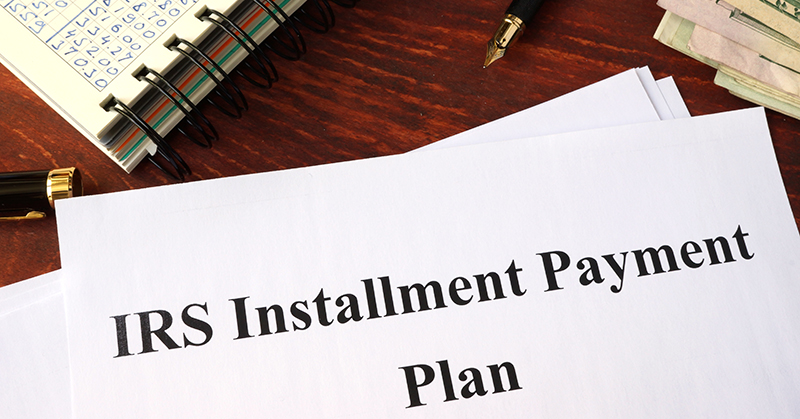Can I pay taxes in installments?
March, 05 2020 by Glynis Miller, CPA, MST
The U.S. tax system is designed to be pay-as-you-go. That means throughout the year, your taxes are prepaid through federal income tax withholdings or quarterly estimated tax payments. By the time you file your tax return, the expectation is that any tax liability you have for the year has been prepaid. Generally, the result is owing little to no taxes with the filing of the tax return or receiving a small refund. However, sometimes life throws you a curveball. You just filed your tax return and you owe, the IRS audited your return and you owe, or they sent you a letter saying you owe additional taxes, but you do not know why. If any of these events have occurred, and you are just not able to pay right away, you may be wondering, “Can I pay taxes in installments?”
Yes, it is possible to pay taxes in installments. In fact, if a taxpayer owing less than $10,000 can pay the balance in full within a three-year period, the IRS will generally approve an installment request for that taxpayer automatically. The automatic approval is known as a “guaranteed installment agreement.” In order to qualify for the guaranteed installment agreement, a taxpayer must have filed all income tax returns timely and paid all taxes due during the last 5 years without using an installment agreement. For taxpayers that do not meet these requirements, other payment options available are 1) Pay Now, 2) Short-term Payment Plan, 3) Long-term Payment Plan (installment agreement, and 4) Change an Existing Payment Plan. If the pay now option worked for everyone, there would be no reason to discuss the other options. Unfortunately, things happen that may require another option.
Short-term Payment Plan Option ($100,000 or less owed)
Perhaps a short-term payment option is all you need. If the combined taxes, penalties, and interest are under $100,000, the short-term payment option allows the tax balance due to be paid in 120 days or less. For this option, you can apply online, by phone, mail, or in-person. The IRS does not charge any additional application or setup fees, but both interest and penalties will accrue until the balance has been paid in full. Payment can be made by debit/credit card, check, money order, or by direct pay from a checking or savings account.
Long-term Payment Plan Option ($50,000 or less owed)
In some cases, even the 120 days or less short-term payment option is just not long enough. Therefore, the long-term payment plan may be the better option if you owe $50,000 or less in combined taxes, penalties, and interest. However, all required tax returns must be filed to be eligible. This plan requires some setup fees that can range between $31 - $225, depending on how you apply for the plan and how you intend to make your monthly payments. If you choose the Direct Debit Installment Agreement (DDIA), payments will come out of your checking account automatically every month. The setup fee is $31 if you apply online but will cost you $107 if you apply by phone, mail, or in-person. Low-income individuals may be able to have their setup fee waived.
For those that prefer to control the actual payment, the cost to setup the installment plan online would be $149, or $225 if by mail, phone, or in-person. A reduced fee of $43 is assessed to low-income individuals who apply online, by phone, or in-person, and if certain conditions are met, this fee could be reimbursed. Payments can be made by using Direct Pay (available to individuals only) or using the Electronic Federal Tax Payment System (EFTPS) or mailing in the payment by check, money order, or debit/credit card. No matter the payment method chosen, interest, and penalties will continue to accrue with this payment option as well until the balance is paid in full.
For many people, the process of applying for an installment plan may not be difficult. However, for some taxpayers, there just might be too many unknown factors in their situation. Those factors include unfiled tax returns, tax bills for an audit notice that was sent to a prior address, and taxes owed on multiple years that exceed the amounts referenced above. Or, maybe you just do not feel comfortable dealing with the IRS to resolve your current tax debt. If this is where you are currently, TaxAudit may be able to assist. Please take a look at our Tax Debt Relief Assistance for all the available services.





